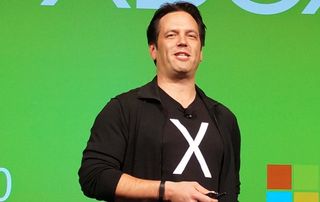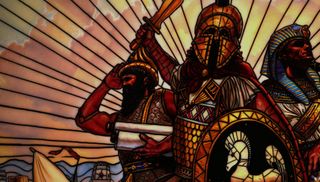
Microsoft's E3 presentation this year was mostly dedicated to its new Xbox One X console, formerly known as Scorpio. As usual, though, we had plenty of questions for Xbox boss Phil Spencer about Windows gaming, including the return of Age of Empires, and the future of the Windows Store and UWP, two of the more controversial elements of Windows 10. Before we dug into those issues, Spencer told us he's interested in bringing original Xbox emulation to the PC.
Below we get into more about the Store, Age of Empires, and what UWP needs to do to earn wider support.
What does Xbox One X mean for the way Microsoft approaches development of Windows games from here on? Will it be easier for your internal studios to target higher-end features on Crossplay games?
Phil: We specifically picked the specification for Xbox One X thinking about where our 4K titles were running on PC—and I've said this before—some of the graphics cards that are out there, around 6 TFLOPs. We have some advantages with memory and other things on console. We have some disadvantages on CPU. So it's not going to be a completely apples to apples comparison. But definitely, not just for our first parties, talking to third parties as well, on teams that are seeing what true 4K can do on PC, and us wanting to deliver a console that without checker-boarding and other techniques could natively hit a 4K framebuffer.
We've been talking for three years now about this journey you guys have been on, the marriage of your Windows games business—
Yep. Still a journey.
That's my question, really. What roads still remain to be traveled? What are the kind of concrete features you think, 'these are the things we should deliver that would further this relationship?'
The biggest gaming news, reviews and hardware deals
Keep up to date with the most important stories and the best deals, as picked by the PC Gamer team.
As a first party, we need to build some PC-first games.
Phil Spencer
I think it feeds into what we've done with you guys today. I think as a first party, we need to build some PC-first games. We learn from building, and building content on top of the platform. Most of the things we've brought to the PC to date from a content perspective have been things that started on console, or frankly started on both, and then ended up on PC and console and PC at the same time. That's why I like the Age [of Empires] announcement today, because it's us going, okay, let's do a PC game. Get into it. There's just a bunch of stuff that's different between the two.
I still think crossplay is one of the things I have a lot of focus on right now. We announced with Minecraft that we're going to link all the platforms—well, not necessarily all of them. We're at Nintendo, PC, and the VR platforms to play together.
Do you think we'll ever live in a world where all of those platforms are playing together?
I think it would be nice.
A world where there's no money either, I guess.
Well, I dunno. Xbox Live on Android, iOS and Windows, we don't make any money from connecting people. You and I probably use a service like Discord. There's different business models where it's not just about charging people. The console space is a little more difficult because there's no money made on the hardware. So in that space the business model has to be a little different.
I'd say another thing we've been doing on the PC side is Mixer, our broadcasting. It was great to get PlayerUnknown on our stage, a huge game on PC. Some of the console people don't know about it. Felt a little bit like our Minecraft announce way back in the day, when we brought that to console. A lot of the console people were like "what is this?"
Chat during our show was saying he's very much PlayerKnown at this point.
Yeah, I know! He's got to change his handle.
But you know, those kinds of games, and the line between what is player and what is viewer, and who the developer is, it's kind of blurring. Having The Darwin Project on, and they showed how Mixer might interact directly with the gameplay itself. I think that's a great place for us. I think about service, and that capability.
We've got more work to do on [the Windows] Store, clearly. I hear the feedback on that. And like I said, as a first party, continuing to do the work that we've done, but also building some PC-first franchises. That's why I love seeing Age coming back.

That was a great moment in our show. It's such a heartland game for us.
We were going to put this on our stage here, at the Xbox briefing. Cause it's a big stage. But I want to support you guys. We are supporters of the show, but also, when we get the opportunity to come on the show, I wanted to have news.
You mentioned the Windows Store. I don't think we saw any changes in the big Creators Update in the summer. And in terms of finding and managing games, it definitely feels like there's ground to be made up still on Steam and GOG and stuff.
There totally is.
Is it still, for the moment, the place you still want to be the primary touchpoint for games like Forza Motorsport 7 going forward? What are the plans to improve it?
Twofold. I think what you're likely to see from us, the term I use is "One store, multiple storefronts." From payment instruments, where all my entitlements are, you want one store on the platform, our at least our store, that knows where you are and what you own.
My view is we will gain UWP adoption when UWP is more functional than msi + Win32. And we're not there yet.
Phil Spencer
But when I want to go buy Forza content, a lot of that's going to happen right in the Forza shell of the game itself. I do think with the Xbox app we could build a more curated pure gaming front-end for core gaming. Right now, our Store has this disadvantage of being everything. From buying a book, to buying a movie, to buying a song track, to buying an app, to buying a game. And relative to my experience on GOG or Steam or even Origin and Battlenet and stuff, those are more direct core gaming front-ends. We have work to go do there. We're thinking about how we can build that experience.
With UWP, it's continued to evolve, and you've fixed some of those early issues, like G-Sync support. Can you share any recent changes or changes that might be coming soon that are relevant to gamers?
Well, we've talked about Centennial and how we've made it easier for Win32 apps, maybe legacy Win32 apps, to get into the Store and get wrapped in something that kind of makes them emulate a UWP on the platform. That's something that's important, because as you and I both know there's such a base of Win32 code that's out there.
I get a lot of questions about why we wouldn't just natively support Win32. There are some issues with Win32 as a long-term app model. It's not really an app model. The idea of an app model wasn't really around when we went from—I was at Microsoft when we went from Win16 to Win32, I remember those translations—so I definitely think we have more work to go do. My view is we will gain UWP adoption when UWP is more functional than msi + Win32. And we're not there yet.
But that's the path that we're on. How do we go make uninstall, install, cleanliness of install, manageability both for the customer and the developer, and the portability when a developer wants to take advantage of that, something that exceeds the ecosystem of Win32 + msi as a way to get things installed. And that's when we'll see wide adoption. And that's the path we're on.

I'll wrap up with a nice one. Tell me a little bit behind the process behind how Microsoft decided to bring Age of Empires back. Had it been kicking around for a long time?
I want to give Shannon Loftis a ton of credit. Shannon's been in Microsoft Studios for a long time, and is somebody I've worked with and have a ton of respect for.
There's some franchises... it's interesting, as we're investing more in our first party, and we've looking at new IP in some of our existing franchises and things that do really well, Age is just one of those things that year after year on Steam, we see it continue to sell, even though the infrastructure that's underneath the game is creaking a little bit. The community's been there supporting it.
She said, you know, this is something we should bring onto our modern platform. Make it visually more up to speed. You're obviously not going to take that game and completely make it a 4K game and everything, but make it look something closer to modern. Support some of the Live features that we have. And then let's think about where this franchise can actually go.
We own it, so maybe it seems like we're talking about ourselves a little bit, but I think it's one of the important franchises in gaming, and I think it deserves a future.
It's the 20th anniversary. So this could be the start of the renaissance? That's how you feel about it?
I do. And I think the interesting thing is the community's been out there kind of supporting this game without us. And shame on us, right?
They crashed the website today.
[Laughs] I'm really excited. They crashed our website? I actually didn't see that.
Straight off the reveal. They had it back up quickly.
Good! Good. I was involved... I started working with Ensemble on Age 3, I think was the first one I as a studio manager was working with them on. That was a studio that had some real vision in what they wanted to do with this mix of history and RTS coming together. I think it's one of those franchises that deserves a great future.
This interview has been edited for length and clarity.
With over two decades covering videogames, Tim has been there from the beginning. In his case, that meant playing Elite in 'co-op' on a BBC Micro (one player uses the movement keys, the other shoots) until his parents finally caved and bought an Amstrad CPC 6128. These days, when not steering the good ship PC Gamer, Tim spends his time complaining that all Priest mains in Hearthstone are degenerates and raiding in Destiny 2. He's almost certainly doing one of these right now.
Most Popular


